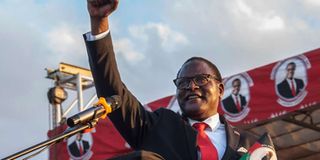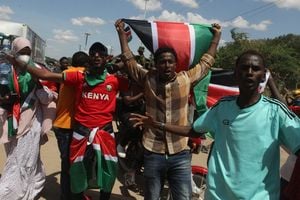Malawi leader Lazarus Chakwera arrives in Nairobi, a city he once called home

Malawi's President Lazarus Chakwera.
The visit to Kenya by Malawi President Lazarus Chakwera marks an important tradition for leaders of the southern African country.
Like one of his predecessors, Joyce Banda, Dr Chakwera has lived in Nairobi, and both have been invited to grace a national day in Kenya by President Kenyatta.
Dr Chakwera, 66, is on a three-day State visit, his first official trip to Kenya since he took over last year in June.
State House Spokesperson Kanze Dena-Mararo said Dr Chakwera will be the chief guest at this year’s Mashujaa Day celebrations at Wang’uru Stadium in Kirinyaga County.
Away from the formal protocol, Dr Chakwera is not new to Kenya’s capital. A renowned cleric in his country before he became president, he often visited and stayed in Nairobi for his ministry work as well as to attend theological academic events.
The former Bishop of the Malawi Assemblies of God used to teach at the Global University, part of the East African School of Theology in Nairobi. And when the Assemblies of God University was set up in Kitengela, Kajiado County, he would regularly speak there during commencement ceremonies.
He will be following in the footsteps of President Banda who was invited in 2013 to attend the 50th Jamhuri Day celebrations at the Kasarani stadium.
Banda, a gender equality activist before she became president in 2012, had lived and studied in Kenya long before she joined politics. She replaced Bingu wa Mutharika to whom she had been vice-president. She later lost elections to Mutharika’s brother Peter.
Chakwera’s story, however, may be an inspiration to opposition politicians who long for power, both in Kenya and across Africa where there has been insufficient space to play dissent.
A Deutsche Welle (DW) feature last year described him as one taking on the comeback symbolism of the biblical Lazarus, a man described in the New Testament as having been entombed for four days before Jesus raised him from the dead. For Dr Chakwera, his rise from the ‘dead’ came in 2019 when the Constitutional Court nullified the elections in which Peter Mutharika had been declared winner, in spite of irregularities.
He had only contested for presidency twice, not as many as Kenya’s Raila Odinga, or Zambia’s new President Hakainde Hichilema, but he was still facing lessons his peers have learnt: that unseating an incumbent was difficult. Yet his rebounce was mostly due to lessons learnt from Kenya.
The Constitutional Court nullified the presidential polls in Malawi after citing heavily the Kenyan Supreme Court decision which had nullified President Uhuru Kenyatta’s initial victory in August 2017.
In Kenya, the court had said an election whose process cannot be defined cannot be said to be fair or verifiable. In Malawi, the courts cited the ruling to annul the results, and lampooned the electoral commission of the country for bending rules to favour the incumbent.
When a repeat election was held last year, Chakwera defeated Prof Peter Mutharika by scoring 58.5 percent of the vote. Under Malawi’s law, a simple majority is sufficient to win, but the Constitutional Court had imposed a 50 per cent plus one rule as the minimum for one to be declared winner.
For his troubles, Chakwera became the first opposition politician to win an election re-run.
In Kenya, Mr Odinga had refused to contest in the repeat election, citing lack of transparency by the Independent Electoral and Boundaries Commission.
Zimbabwe’s then opposition leader Morgan Tsvangirai, who had won round one of the vote in 2008, was later cowed into a boycott after Robert Mugabe’s feared police descended on his supporters with violence. They later formed a troubled coalition government, again borrowing from Kenya’s grand coalition government of Odinga and Mwai Kibaki.
Back to Chakwera, his rise to political stardom has been interesting. He was born in a poor family outside the capital Lilongwe. Initially a shy boy walking barefoot to school, he wanted to study medicine, which he later told an interviewer was because doctors are generally required to speak less, so his shyness won’t be a barrier. By the time he joined politics, he had turned his head towards theology, having studied in South Africa, and the US.
Argue with God
Yet he feels joining politics needed him to first “argue with God” as it did not seem natural, according to one video clip posted by the St Andrew’s Presbyterian Church in the US.
His favourite Bible stories? Exodus 3, the story of Moses’ arguments with God on assignment to deliver Israelites from bondage in Egypt. Moses, who spoke with a stammer, had been initially reluctant as he feared he could not speak properly.
Chakwera speaks with an American accent and it’s claimed he picked it imitating some American teacher. One year since he took office though, he has been accused of doing some things that contradict his pre-election pledges. For example, his first cabinet included people who were relatives, a false start for a president who promised to tackle cronyism and tribalism in Malawi’s civil service.
More trouble
Malawi’s Nation newspaper once described this move as Chakwera’s ‘charity beginning from home.’ He promised to deal with the matter. Later, he ran into more trouble for including his close family members on a delegation to the UK, to which he argued their inclusion was not just a joyride.
In June, at the 57th independence celebrations, he lost his cool, terming as time-wasters those criticizing his failure to meet pledges.
“To achieve economic liberation, what we need is not more talking or more shouting, or more finger pointing or more politicking, or more begging, or more gossip, or more meetings or more political parties or more prayers,” he ventured in his pulpit rhyme scheme, according to Malawian daily Nyasatimes.
“If any of these things were God’s formula of prosperity, Malawi would be the wealthiest of the nations.”
On Monday, he announced he was forming the Presidential Delivery Unit (PDU), a presidential office meant to “ensure government ministries, departments and agencies are implementing the key priorities,” he said. “The PDU will track the implementation of the priorities,” he added, referring to his pledges. The PDU is another lesson from Kenya.





